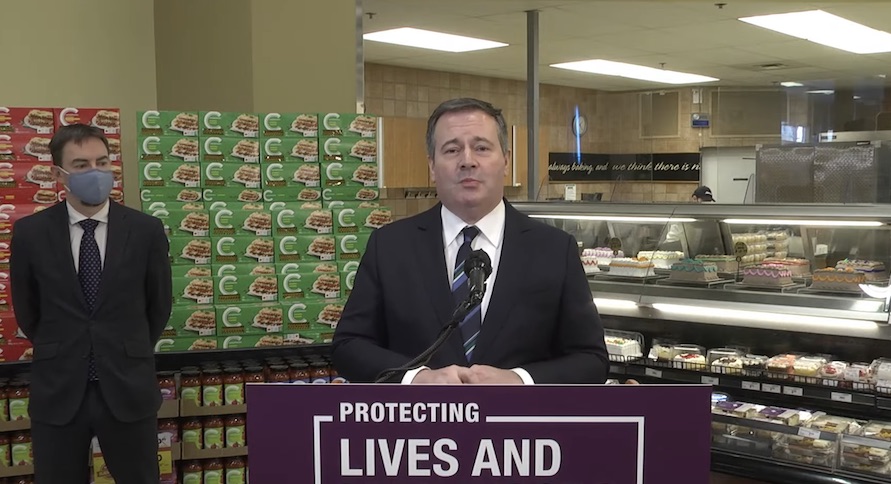Was Jason Kenney channelling Marie Antoinette when he appeared in front of an Edmonton grocery store’s cake counter yesterday to announce a one-time $1,200 pandemic payment to front-line workers?
Many of the front-line workers risking COVID-19 to deliver us services from health care to retail confections may be badly paid, but they’ll have a little extra cash soon, and the pastries looked delicious, so why not let them eat cake?
Whoever the Alberta premier was trying to channel, it was pretty clear that the decision to finally hand out the predominantly federal cash, which seemed to have been organized rather hastily, was a desperate attempt to change the channel on Kenney’s recent political woes.
What with sun-seeking MLAs, that pipeline-cancelling American president, a popular uprising against his government’s plan to lop off some mountain tops to mine coal, and now an open rebellion by a couple of COVID-denying MLAs on the loony right of his disunited United Conservative Party caucus, Kenney has suffered an undeniably catastrophic start to 2021.
So why not try to change the channel and let Justin Trudeau pay for it?
Presumably that was the conclusion of some bright spark in what’s left of the premier’s strategic brain trust — diminished by recent resignations, lateral moves and, in the case of Kenney’s well-travelled chief of staff, a politically necessary firing.
Kenney did his best to keep a smile on his face at his news conference as he and Labour Minister Jason Copping, now sporting a sinister pandemic goatee, talked up the plan to distribute $465 million to some 380,000 Alberta public- and private-sector employees classified rather haphazardly by the government as “critical workers.”
Recipients of what the premier termed “bonus pay” will include health-care, social services and education support workers in the public sector, and grocery store staff, food production workers, and other private-sector employees who earn less than $25 an hour.
They can’t be certain they’ll get the money, however, as their employers must apply to the government by March 19 for them to get the payments.
To qualify, recipients will need to have worked at least 300 hours between October 12, 2020, and January 31, 2021 — a determination, presumably, also to be made by their employers.
“We trust this support will help these workers continue to protect lives and livelihoods as we keep fighting this pandemic together,” said the premier.
The government’s news release mentioned the federal government in passing, but passed rather lightly over the fact the bulk of the cash will come from federal funds for top-up payments for low-paid essential workers that the UCP government has left lying on the table for months. The provincial share will come to $118 million.
But for the most part, even the tight controls applied at UCP virtual news conferences nowadays couldn’t keep journalists from focusing on the defiance of MLAs Drew Barnes and Angela Pitt, who signed on Tuesday with something called the End the Lockdowns National Caucus to undermine the UCP’s half-hearted effort to control the spread of COVID-19.
UCP issue managers and their ilk were quick to complain about this lack of interest in the actual topic of the news conference by the journalists who called in to yesterday’s effort in the cake shop.
Normally, this would seem fair. But under the circumstances, the most important part of the story was arguably its political motivation, and why it was being announced now after nine months of foot dragging on distributing the federal cash.
It’s the government, after all, that sets the rules for its rigidly controlled events, with their short time spans, limits on questions reporters may ask, and pro-government columnists usually available to run out the clock on their competitors’ tougher questions.
Kenney seemed testy when asked if he would allow Barnes and Pitt remain in his caucus.
As Barnes predicted yesterday, he will.
“We have a wider latitude for MLAs to speak their views in this province and in the party I lead than perhaps is the case in other parties and other parts of the country,” the premier said piously. Given his well-known micro-managing tendencies, this seems unlikely to be the reason.
Nor are questions about the program necessarily going to please the government.
Dean Bennett of the Canadian Press asked:
“As you stand there today offering $1,200 and saying to public-sector workers, ‘we’ve got your back,’ at the same time isn’t your government pursuing with these unions cuts to their salaries, three per cent or more? So how do you square that … when your government plans to claw back that and a whole lot more starting with the budget two weeks from now?”
Kenney’s answer: “This is a one-time payment, a bonus of sorts, to recognize a one-time unique circumstance.” As for the planned cuts, he went on, “Money does not grow on trees. … We have to protect the health of the province’s finances.”
Well, around here money only grows on federal trees, at any rate.
It is true, though, that no one had a chance to ask why front-line workers like jail guards and social workers, employed directly by the provincial government and at great risk from COVID-19, were denied the payments. Or why the rules don’t allow the 26,000 front-line education workers who were laid off last March to qualify.
As for Kenney, it seems distracting Albertans from his string of recent disasters won’t be a cake walk.
He can take comfort, though, from the knowledge that in 21st-century Canada his troubles will never be as bad as those of the 18th-century French queen whose purported remark about cake we remember still.
David Climenhaga, author of the Alberta Diary blog, is a journalist, author, journalism teacher, poet and trade union communicator who has worked in senior writing and editing positions at The Globe and Mail and the Calgary Herald.
Image credit: Video screenshot/Government of Alberta



